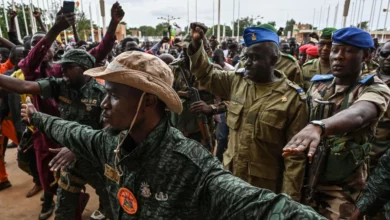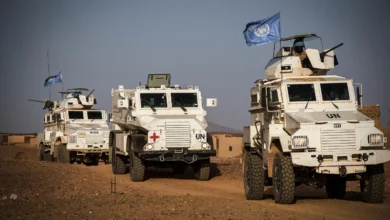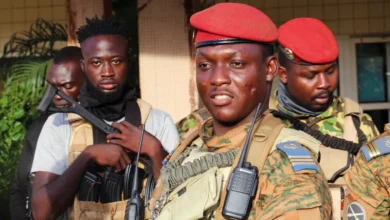
The soldiers who staged a coup in Mali in March said they had defeated a counter-coup by foreign-backed forces loyal to the ousted president in fighting that left 14 people dead.
They called the attack by paratroopers an attempt at a targeted killing of coup leader Captain Amadou Haya Sanogo, but insisted that the turmoil would not affect the rule by an interim civilian government.
Sanogo, who led the 22 March uprising that ousted president Amadou Toumani Toure, in a TV interview pledged that the transitional deal he agreed to on 6 April restoring civilian rule remained in force.
The resurgence of fighting however dimmed hopes for a quick return to order in the west African country where the turmoil has allowed Tuareg rebels and Islamist militants to seize the northern half of the country.
Gunfire erupted late Monday at the national television and radio station, the airport and at Kati, the garrison town near the capital that is the headquarters of the rebel soldiers.
By Tuesday morning, armoured vehicles were seen outside the key sites, and the junta leaders said on national TV they had restored order, though sporadic gunfire could be heard in the city.
A soldier reading out a message on television on behalf of Sanogo said "foreign elements backed by dark forces from inside the country carried out these attacks", adding that some had been arrested.
"We have had 14 dead and 40 wounded," Gabriel Toure hospital director Abdoulaye Nene Coulibaly told AFP, saying casualties were from both sides.
An AFP reporter saw members of the junta enter the Gabriel Toure hospital and whisk away several of the wounded troops loyal to the ousted president in 4X4 vehicles.
An angry officer shouted at the wounded: "Now you're going to tell us who were the ones who forced you to provoke us! You've been taught a lesson but it's not over yet."
While Sanogo on TV said the situation was "under control", an AFP reporter and witnesses heard heavy gunfire at around 1000 GMT near the loyalist base in central Bamako, though it was unclear who was shooting.
The junta's army chief of staff Ibrahim Dahirou Dembele later said on TV that the fighting had been an attempt to kill Sanogo.
"With the support of mercenaries, the paratroopers were to initially take over the (TV and radio station) and airport to allow reinforcements to arrive," he said.
"In a second step, the operations would lead them to attack the barracks of Kati with the aim of killing military leaders and especially… Sanogo."
He warned that "the enemies of Mali and their accomplices are at work".
The TV broadcast showed images of suspected loyalists who had been arrested, including one with what were said to be Burkina Faso ID documents.
When the Mali renegade soldiers staged their coup on 22 March, shortly before scheduled elections, their power grab shattered the country's image as a democratic success story in the region.
Under diplomatic pressure from Mali's partners and military pressure from the advancing rebellion in the north, the junta agreed to hand power over to Dioncounda Traore, the former parliament speaker.
Traore was sworn in as interim president on 12 April, but the situation in the country has remained volatile, and the junta has remained a political player that has made its influence felt.
Amid the chaos, an area the size of France has fallen into the hands of Islamist militias and Tuareg separatist rebels, many of them battle-hardened after serving as mercenaries in the Libyan conflict.
Concerned about the instability, the Economic Community of West African States has mediated the handover to an interim civilian government and pressured the junta to return to the barracks, with mixed success.
Sanogo on Saturday rejected a plan by ECOWAS leaders to send a stabilisation force and also nixed their demand for elections in Mali within 12 months.
A meeting that had been planned for Tuesday between an ECOWAS mediator, Burkina Faso President Blaise Compaore, and a delegation of the former junta was cancelled, a source close to the mediators said.




